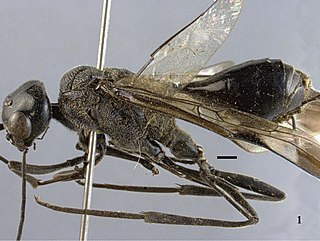
The Chironomidae comprise a family of nematoceran flies with a global distribution. They are closely related to the Ceratopogonidae, Simuliidae, and Thaumaleidae. Many species superficially resemble mosquitoes, but they lack the wing scales and elongated mouthparts of the Culicidae.

The Gasteruptiidae are one of the more distinctive families among the apocritan wasps, with surprisingly little variation in appearance for a group that contains around 500 species in two subfamilies and with 6 genera worldwide. They are members of Evanioidea.
Jean-Jacques Kieffer was a French naturalist and entomologist who specialised in the study of parasitic insects. Educated as a priest, Kieffer taught natural science in Bitche, Lorraine while working on the description and classification of insects. His work and publications later became a predominant source of description and classification for entomologists in the early 20th century, in particular with regard to parasitoid wasps, midges, and mosquitos.

Tanytarsus is a large genus of non-biting midges of the tribe Tanytarsini and subfamily Chironominae of the bloodworm family (Chironomidae). The larvae of these insects occur in a wide range of freshwater habitats with some species being marine.

Chironomini is a tribe of midges in the non-biting midge family (Chironomidae).
Lauterborniella is a genus of non-biting midges in the family Chironomidae, found in Europe, Africa, and the Americas.
Pentaneurini is a tribe of midges in the non-biting midge family (Chironomidae).

Diamesinae is a subfamily of midges in the non-biting midge family (Chironomidae).
Diamesini is a tribe of midges in the non-biting midge family (Chironomidae).
Podonominae is a subfamily of midges in the non-biting midge family (Chironomidae).

Leptoconops is a midge genus in the family Ceratopogonidae. It has a mostly tropical or subtropical distribution worldwide, but some species occur as far north as Moscow region in Russia and the Yukon Territory in Canada.
Calliscelio is a parasitoid wasp genus which contains two species, C. elegans and C. teleogrylli.
Liopteridae is a family of wood-boring parasitoid wasps. They occur worldwide with concentrations in the African Tropics. These insects have a petiolate abdomen. There are 10 genera and more than 140 species known.

Contarinia is a genus of midges, small flies in the family Cecidomyiidae. There are over 300 described species in the genus.

Atrichopogon is a genus of biting midges, small flies in the family Ceratopogonidae.
Habroteleia is a genus of parasitic wasps in the family Platygastridae. There are about 9 described species in Habroteleia.
Micromyinae is a subfamily of wood midges, insects in the family Cecidomyiidae. Its members were formerly included in subfamily Lestremiinae. There are at least 55 genera and more than 650 described species in Micromyinae. All species in this subfamily are mycophageous.
Evaniella is a genus of ensign wasps in the family Evaniidae. There are more than 70 described species in Evaniella.

Aulacus is a genus of aulacids, ensigns, and gasteruptiids in the family Aulacidae. There are 77 species of Aulacus.

Evania is a genus of ensign wasps in the family Evaniidae. Like all members of the family, they are cockroach egg parasitoids. There are more than 60 described species in Evania. Evania appendigaster, the blue-eyed ensign wasp, is a common wasp found through most of the world.








